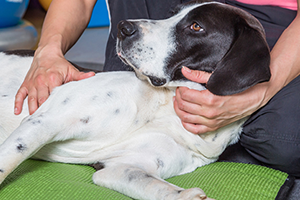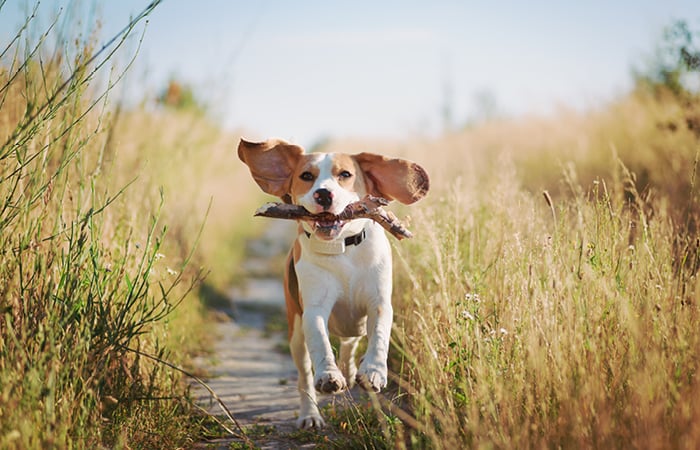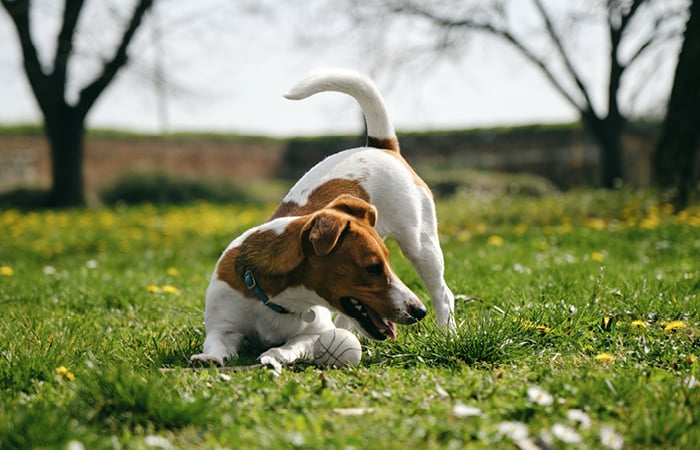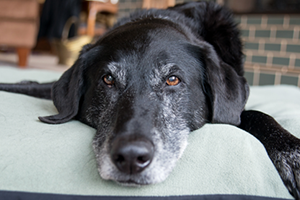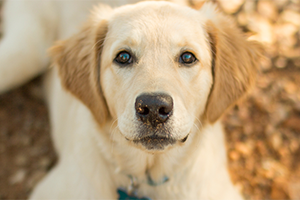
A naturally intelligent, gentle and fun-loving family friend who’s always full of energy.
Vital stats
Swipe to view more
| Size: | Large |
| Coat: | Double coat, groom weekly |
| Exercise | 2+ hours a day for adult dogs |
| Life span: | 10+ years |
| Breed group: | Gundog |
| Temperament: | Reliable, loyal, kind |
Golden Retriever temperament & personality

- One of the UK’s most popular family pets, Golden Retrievers’ gentle, loving nature makes them a great choice for families with children of all ages.
- Due to their gundog breeding, Golden Retrievers are eager to please and intelligent making them easy to train and ideal for novice owners.
- These highly active dogs will thrive in busy, active households with lots going on – they love long walks and adventures so suit outdoorsy households.
Golden Retriever training & exercise

Training tips
- Intelligent and eager to please, Golden Retrievers relish the chance to learn and are quick to pick up commands.
- This affable breed responds best to positive reinforcement methods and will respond to your tone of voice. Since life is a game for these big, affable dogs, they respond well to upbeat training methods using your voice and positive reinforcement.
Exercise
- Whether it’s swimming, running, chasing, even playing hide and seek – these dogs just love burning off energy in the great outdoors.
- Golden Retrievers are natural born swimmers and this is a great form of exercise for older dogs or dogs with joint issues.
Keeping them happy
- Active and energetic, Golden Retrievers need plenty of physical exercise and may turn to destructive behaviours, such as chewing and scratching, without other outlets for their energy.
- Aside from a couple of hours walking each day, Golden Retrievers relish human interaction and the chance to learn.
Game ideas
- The clue is in the name “retriever” – these dogs love a game of fetch and will happily keep playing for as long as you can throw the ball!
Common Golden Retriever health conditions

Golden Retriever grooming

Golden Retrievers are known for their lustrous double coat, comprising a thick undercoat and a water-repellent top coat – so they need to be brushed regularly.
- They are prone to shedding, but using a de-shedding tool to thin out the undercoat and keep on top of the hair loss can help.
- They tend to shed lightly throughout the year, but more so in spring and autumn. In summer, you could also take your pet for a ‘haircut' at the groomers, which will usually involve trimming the longest feathered fur.
- Due to the breed's love of water (and mud!) you may need to bathe your Golden Retriever fairly often, using a pet-friendly shampoo to prevent any skin reactions.
- Brush your Golden Retriever’s teeth regularly to prevent tooth or gum disease. It’s a good idea to introduce this as a part of your puppy’s routine early, as it’ll help familiarise them with the process.
Golden Retriever nutrition

What do Golden Retrievers eat? Most things, given half a chance! During their hunting days, Golden Retrievers needed lots of food to fuel their active work, and their love of eating still endures.
- Vets recommend feeding a high-quality, breed-appropriate food twice a day, and keeping an eye on portion sizes by following the guidelines on the back of the pet food packaging.
- Try to avoid giving too many scraps or they may become overweight. Golden Retrievers can suffer from tummy trouble so ensure you don’t over feed them or feed them too many treats.
- Golden Retrievers can be prone to suffering from joint conditions so keep your pet's lifestyle and activity level in mind, adding plenty of exercise to their routine to help them stay in shape and maintain healthy weight.
What to know before you buy or rehome a Golden Retriever

Considering buying or rehoming a Golden Retriever? Before you find a puppy or adopt, here are a few important things to remember.
- Golden Retrievers are prone to shedding throughout the year, so may not be the best choice for people with allergies.
- Like all dogs you will need to ensure they are well-socialised as puppies and trained. This will help your Golden Retriever get along well with you and others, including other dogs.
- It’s important to get your Golden Retriever puppy from a reputable breeder so you can meet the puppy’s mum and check she has the temperament you’re looking for. ‘Lucy’s Law’ dictates that new puppies or kittens must be bought directly from a breeder or adopted from rescue. Third party sellers are now illegal.
- Like all breeds, Golden Retrievers can suffer from a range of health conditions, and joint conditions like elbow or hip dysplasia are particularly common in the breed. A reputable breeder will be able to provide proof of genetic testing, like hip and elbow scores, for both parents to help you choose a healthy dog.
Golden Retriever frequently asked questions
Discover some of the most popular dog breeds
Golden Retriever insurance considerations
We always offer these things as standard:
Physiotherapy & pet therapies
Along with physiotherapy, which is covered within the Vet Bills benefit, we also cover Pet Therapies like herbal medicine, homeopathy and acupuncture. You can also claim for hydrotherapy, up to £500 per illness/injury in dogs and cats (no additional limit for rabbits).
Petplan is a trading name of Pet Plan Limited (Registered in England No. 1282939) and Allianz Insurance plc (Registered in England No. 84638), Registered office: 57 Ladymead, Guildford, Surrey GU1 1DB.
Pet Plan Limited is authorised and regulated by the Financial Conduct Authority. Financial Services Register No. 311969. Allianz Insurance plc is authorised by the Prudential Regulation Authority and regulated by the Financial Conduct Authority and the Prudential Regulation Authority. Financial Services Register No. 121849. Pet Plan Limited is a subsidiary of Allianz Insurance plc.





































